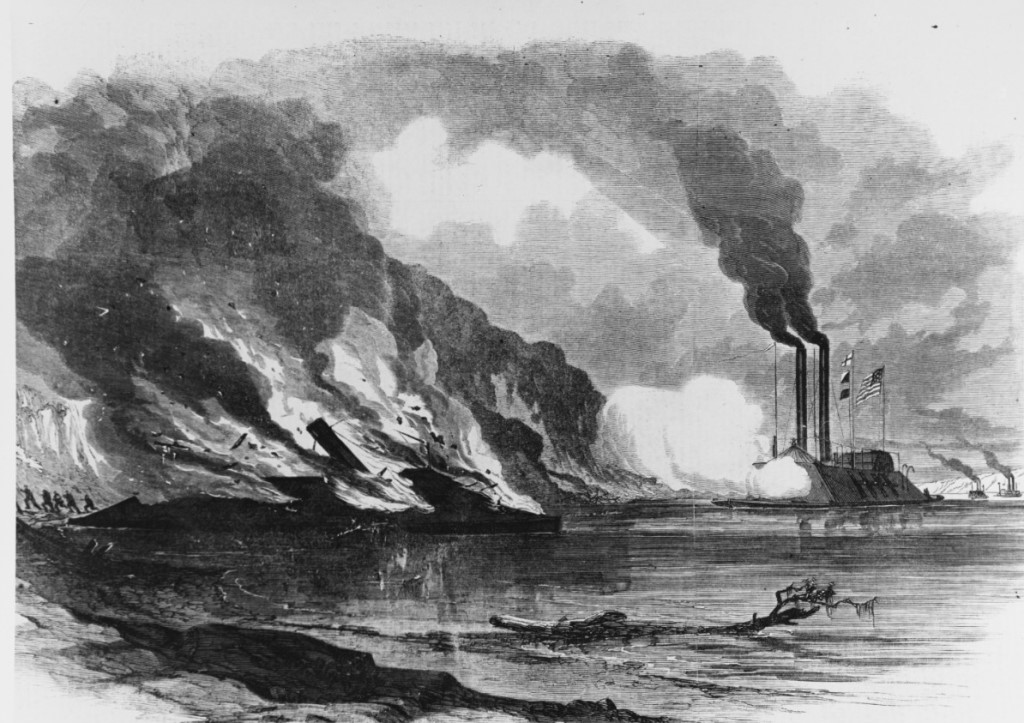|
|
The Arkansas in Poetry | |||||||||||||||||||||||
|
|
||||||||||||||||||||||||
|
The 156th Anniversary of
The Confederate Ironclad Ram "CSS ARKANSAS"
" Oh hark! do you hear the cannon's faint roar, As it
rumbles and echoes from the far distant shore?" A soldier at Vicksburg witnessed the famous battle between the Arkansas and the Federal fleet above the river. He described it thus: Before daylight, we heared the distant boom of a single gun. We listened intently, and soon another followed, and then another, in rapid succession. We remarked "She's coming, boys," and immediately all hands rushed to their posts in our batteries, ready for action. We were not long in suspense; just at the dawn of day, although we could not see the vessels we could see the smoke of the battle curling and eddying over the place of the conflict. The roar of the cannon was like one continued roar of heavy thunder We know that the odds against the solitary vessel was almost overwhelming, and of course our excitement was intense. At length the apparently little thing emerged from the smoke, rounded the point above the city, and hove in sight with her flag still flying As she neared the landing, our pent up enthusiasm burst forth; some jumped up and shouted, others rolled on the ground, while some sturdy veterans wept for joy. We afterwards learned that the flag-staff had been shot in two, when a little boy crept through a port-hole and tied the flag to the stump. The gallant commander, when greeted and applauded for his wonderful achievement, modestly replied, "We owe our safety to a protecting Providence. Our escape was little less than a miracle." The following lines are composed to commemorate the glorious achievement, and respectfully dedicated to Commander Brown and his gallant crew: A Hundred To One Oh hark! do you hear the cannon's faint roar, As it rumbles and echoes from the far distant shore? Hark! again it burst forth, and the answering gun Tells us faintly " she's coming, " the gauntlet to run. Now boom answers boom, and crash follows close, As she sweeps through the track beset with her foes; Tis the Barque which is coming, single-handed, alone, Which throws down the gauntlet, one hundred to one. Now see by the smoke, how aloft it is whirled, As the hail-storm of shot gainst her bulwarks are hurl'd In vain do her foes pour sheets of live flame Upon her rude sides, as she floats down the stream. Still from their rude throats, her war-dogs reply, " Never Surrender - tis better to die! " Tis the Barque that is dashing, single-handed, alone, And throws down the gauntlet, one hundred to one. And now she emerges from the battle's dun shroud, As an eagle, triumphant, cleaves through the cloud; On her fragment of staff her ensign still flows, Which kept the bright stars, and gave the stripes to her foes; And Vicksburg, beleaguered, as safe she draws near, Welcomes the heroes with cheer upon cheer. Tis the Barque that has triumph'd, single-handed, alone, And ran through the gauntlet, one hundred to one. We will weave for the brows of the glorious crew, The chaplet of laurel, entwined with the yew; Applause for the living, and tears for the dead, Who, lifting their hearts when the conflict was o'er, Gave praise to the God whom nations adore, For the Barque has pass'd safely, single-handed, alone, And run through the gauntlet, one hundred to one. from the Natchez Daily Courier, Friday November 21, 1862 (Vol. XI, No. 39 pg. 1) Poem to the Confederate Dead on the monument to their memory in Soldiers Rest Cemetery where the dead of the Arkansas crew are buried. We care not whence they came, Dear in their lifeless clay, Whether unknown or known to fame, They died, and they wore the gray.
Here rest some few of those who, vainly brave, Died for the land they loved, but could not save.
Our dead are mourned forever! Through all the future ages, in history and in story, Their fame shall shine, their name shall twine; they need no greater glory. Tenderly fall our tears over their lifeless clay: Here lie the dead who fought and bled and fell in garbs of gray. Ours the fate of the vanished, whose heartaches never cease. Ours regrets and tears; theirs the eternal peace.
|
||||||||||||||||||||||||
|
soldiersrest@embarqmail.com Use back button to return.
|
||||||||||||||||||||||||
|
|
||||||||||||||||||||||||
|
|
||||||||||||||||||||||||
